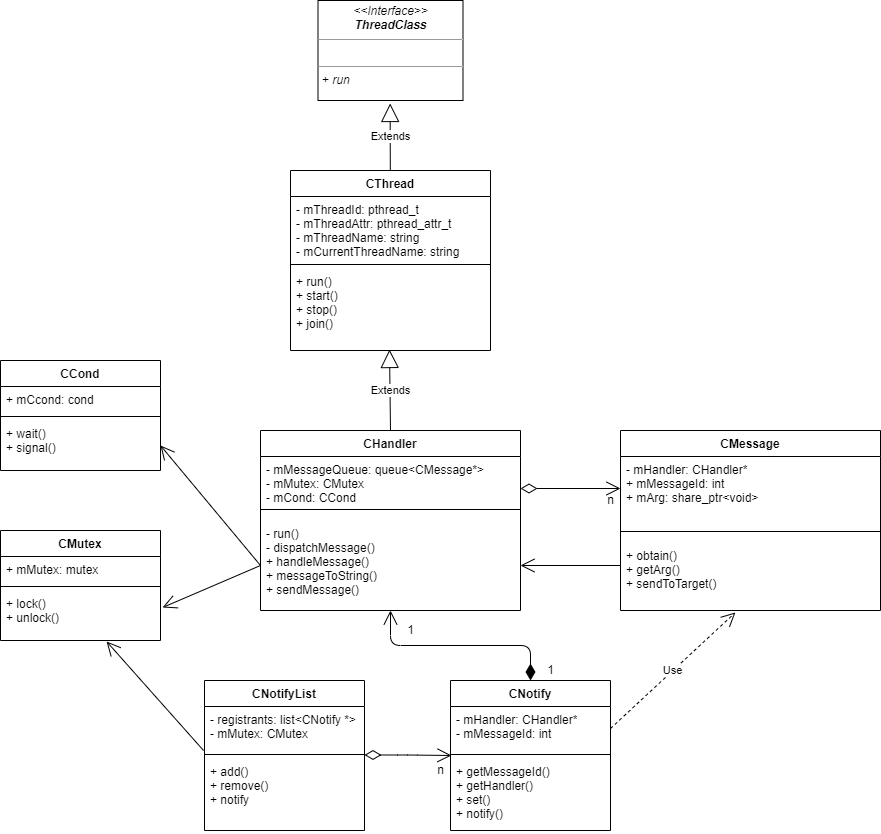设计目的 当发送消息的线程任然有任务时,就可以使用此机制,来进行消息的通知。
此消息处理机制是开启了一个线程进行接受数据并处理,所以不影响发送消息的线程。
使用场景
状态上报:客户端收到server的上报时,使用此机制开启线程处理上报,接受消息的线程继续接受不会阻塞
其他模块的上报:如电池电量变化通知到我们sdk中的回调函数,此时是由负责电池电量部分创建线程执行的,利用此机制不会阻塞第三方模块的线程
开启自定义的线程,达到条件后,可以借此机制运行自己的线程函数
机制设计 主要有两个类:CHandler和CMessage
CHandler:消息处理类,负责发送和接受消息,通过原子操作实现自己发给自己消息
CMessage:消息体,负责创建消息,消息中包含接受此消息的CHandler,方便其他对象向不同的CHandler发送消息
工具类也有两个:CNotify和CNotifyList
CNotify:包含CHandler和id,可以注册一条消息,以及通知消息。实现不同对象间的消息通知。
CNotifyList:CNotify的集合,可以通知多个CHandler对象
结构如下:
使用方式
需要接收消息的对象继承CHandler,并调用线程启动函数start(),start()函数具体参考CThread
必须重写handleMessage(),可以选择重写MessageToString()方法,建议重写
发送消息的对象创建CNotify或CNotifyList对象,并接收需要通知的对象注册
CHandler通过sendMessage()向自己发消息并处理,或者接收已经被注册的对象发送的消息
CHandler的实现 主要使用原子操作进行数据的同步:
1 2 3 4 5 6 7 8 9 10 11 12 13 14 15 16 17 18 19 20 21 22 23 24 25 26 27 28 29 30 31 32 33 34 35 36 37 38 39 40 41 42 43 44 45 46 47 48 49 50 51 52 53 54 55 56 57 58 59 60 61 62 63 64 65 66 67 68 69 70 71 72 73 74 75 76 77 78 79 80 81 82 83 84 85 86 87 88 89 90 91 92 93 94 95 96 97 98 99 100 101 102 103 104 105 106 107 108 109 110 111 112 113 114 115 116 117 #include "chandler.h" CHandler ()CHandler ()obtain (this ,C_MESSAGE_HANDLER_EXIT)->sendToHandler ();lock ();wait (&mMutex, 50 );unlock ();stop ();join ();void CHandler::run () nullptr ;bool exit_flag = false ;while (!exit_flag)lock ();if (mMessageQueue.empty ())printf ("wait new message\n" );wait (&mMutex);front ();pop ();unlock ();if (message != nullptr )dispatchMessage (message);delete message;nullptr ;printf ("[%s] prepare exit" , getThreadName ().c_str ());lock ();while (!mMessageQueue.empty ())front ();pop ();delete message;nullptr ;signal ();unlock ();printf ("[%s] exit\n" , getThreadName ().c_str ());bool CHandler::dispatchMessage (CMessage *message) if (message != nullptr )if (message->getMessageId () == C_MESSAGE_HANDLER_EXIT)printf ("[%s] <= [%s] message[C_MESSAGE_HANDLER_EXIT]\n" , (message->getHandler ())->getThreadName ().c_str (), (message->getOriginName ()).c_str ());return true ;printf ("[%s] <= [%s] message[%s]\n" , (message->getHandler ())->getThreadName ().c_str (), (message->getOriginName ()).c_str (), messageToString (message).c_str ());handleMessage (message);return false ;CMessage *CHandler::obtainMessage (int message_id) return CMessage::obtain (this , message_id);void CHandler::sendMessage (CMessage *message) if (message == nullptr )printf ("message is null\n" );return ;lock ();push (message);if (mMessageQueue.size () >= 1 )signal ();unlock ();std::string CHandler::messageToString (CMessage *message) if (message == nullptr )return "" ;switch getMessageId ())case C_MESSAGE_HANDLER_EXIT:return "C_MESSAGE_HANDLER_EXIT" ;default : return "UNKNOWN" ;
CMessage的实现 CMessage比较简单,使用静态方法obtain生成对象,使用getArg获取参数
主要运用了模板函数,此处贴上他们的模板函数:
1 2 3 4 5 6 7 8 9 10 11 12 13 template <typename T>static CMessage *obtain (CHandler *handler, int message_id, std::shared_ptr<T> arg) void > p_arg = std::static_pointer_cast<void >(arg);new CMessage (handler, message_id, p_arg);return message;template <typename T>std::shared_ptr<T> getArg () return std::static_pointer_cast<T>(mArg);
CNotify的实现 CNotify的实现是保存CHandler对象的指针以及messageid,在需要通知时接收参数并创建CMessage对象再进行发送,set()方法就是简单的赋值,主要看通知方法:
1 2 3 4 5 6 7 8 template <typename T>void notify (std::shared_ptr<T> arg) if (mHandler != nullptr )obtain (mHandler, mMessageId,std::static_pointer_cast<void >(arg))->sendToHandler ();
CNotifyList的实现 接收CHandler对象的指针以及messageid,创建CNotify并保存到队列中,通知时调用CNotify的通知方法就可以了,主要展示通知方法:
1 2 3 4 5 6 7 8 9 10 11 template <typename T>void notify (std::shared_ptr<T> arg) lock ();for (it = mNotifications.begin (); it != mNotifications.end (); ++it)notify (arg);unlock ();
